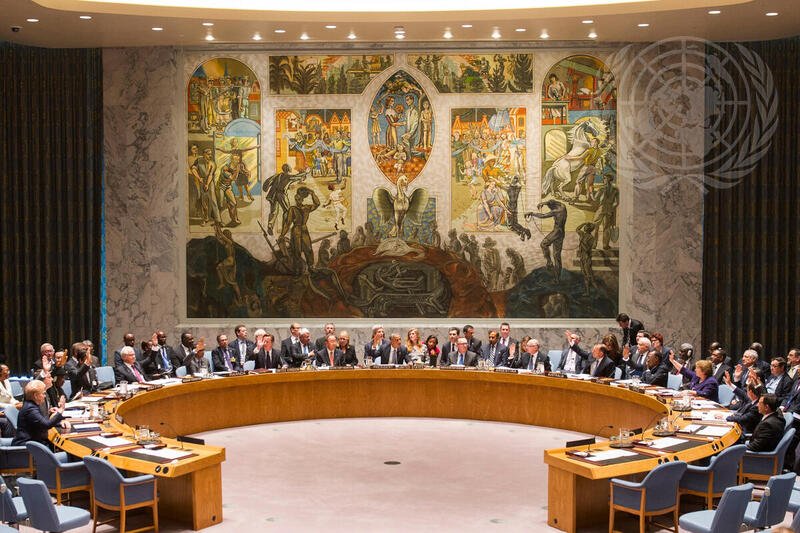Overview of the Sanctions Committee’s Role
The United Nations Security Council established the sanctions committee to address threats posed by designated individuals and entities linked to terrorism, specifically focusing on organizations such as ISIL (Da’esh) and Al-Qaida. This committee operates under several key resolutions, including 1267 (1999), 1989 (2011), and 2253 (2015), which collectively lay the foundation for the framework surrounding targeted sanctions. The intent of the sanctions is to deter and prevent acts of terrorism while maintaining international peace and security.
The primary functions of the sanctions committee involve the identification and listing of individuals and organizations associated with ISIL and Al-Qaida. This process includes thorough investigations that draw on intelligence reports and information shared by member states. Once an entity or individual is designated, the committee imposes a range of sanctions, including asset freezes, travel bans, and arms embargoes. These measures are critical for disrupting the operational capabilities and financial resources of terrorist groups, thereby mitigating their impact on global security.
An important aspect of the committee’s work is its ongoing monitoring and review of the sanctions list. The committee regularly assesses the need for maintaining or lifting sanctions based on changing circumstances in the geopolitical landscape, ensuring that the measures remain relevant and effective. Additionally, the committee facilitates communication and cooperation among member states to enhance collective action against the threats posed by terrorism. Through its rigorous approach, the sanctions committee plays a crucial role in the broader context of the United Nations’ efforts to combat international terrorism and enhance global security.
Details of the Amended Entry
On October 16, 2025, the UN Security Council’s sanctions list witnessed pivotal amendments centered around Ahmad Hussain Al-Sharaa, an individual with significant links to both ISIL and Al-Qaida. The entry for Al-Sharaa now reflects his aliases, including Abu Ahmad and Al-Shara, enhancing the clarity of his identification within counter-terrorism frameworks. Born on September 15, 1985, in Syria, Al-Sharaa holds Syrian nationality, which further complicates the geopolitical implications of his activities.
The amendments to his sanctions entry are critical as they underscore the UN’s commitment to combatting terrorism on a global scale, particularly in relation to the operational networks of ISIL and Al-Qaida. The recent updates signify that Al-Sharaa has been actively involved in orchestrating terrorist activities that threaten international peace and security. Such associations necessitate vigilant monitoring and regulation, as they contribute significantly to the evolution and capability of global terrorist networks.
The inclusion of detailed personal information in the sanctions list not only aids national and international intelligence agencies in their ongoing investigations but also facilitates enhanced cooperation among states in efforts to combat the financing and proliferation of terrorism. The revisions highlight the importance of maintaining updated intelligence regarding individuals who pose risks to safety and security worldwide.
Moreover, the decision to amend Al-Sharaa’s entry reflects a broader strategy embracing comprehensive data sharing among UN member states, which is crucial in identifying and mitigating potential terrorist threats before they escalate. Through this proactive approach, the UN Security Council aims to curtail the operations of individuals associated with terrorist organizations and disrupt their support networks. By taking such necessary actions, the international community strengthens its resolve toward eradicating the menace posed by ISIL and Al-Qaida, reaffirming its stance against terrorism in all forms.
Impact of the Sanctions on Terrorism
The recent amendments to the UN Security Council’s sanctions list concerning ISIL and Al-Qaida underscore a critical component in the ongoing international fight against terrorism. These sanctions are designed not only to punish entities associated with these groups but also to serve as a deterrent against their influence and activities. By restricting access to financial resources and operational capabilities, sanctions impede the ability of these organizations to execute their agendas effectively.
One of the primary impacts of the sanctions is the disruption of funding channels. Designations that freeze assets associated with individuals and organizations tied to ISIL and Al-Qaida can significantly limit the availability of funds necessary for conducting terrorist operations. This financial pressure can lead to reduced operational capabilities, making it more difficult for these groups to sustain their activities, recruit new members, and maintain existing networks. The inability to access financial resources can weaken their overall structure, causing fragmentation and internal conflicts.
Moreover, sanctions can have a broader societal impact by creating a stigma associated with individuals and organizations involved with terrorism. This stigma can deter potential recruits who may otherwise be drawn to the promises of radical groups. The limited ability to obtain legal employment and financial support leads to diminished appeal, making recruitment efforts less effective. Additionally, sanctions can encourage states to enhance their counter-terrorism measures, thereby fostering better cooperation among nations in addressing the threat of global terrorism.
While the efficacy of sanctions can vary, their role in disrupting the logistics and recruitment strategies of terror networks remains significant. The integration of targeted sanctions, alongside diplomatic measures and military action, forms a comprehensive approach to combating terrorism on a global scale.
Access to Sanctions Lists and Resources for Further Information
Accessing the updated sanctions lists concerning ISIL (Da’esh) and Al-Qaida is crucial for understanding the international community’s efforts in combating terrorism. The UN Security Council maintains an official sanctions list that outlines individuals and entities associated with these groups. This list is regularly updated to reflect changes in the situation or the status of the listed subjects. Readers can find the most recent updates on the official UN website, where these sanctions are clearly detailed, along with explanations for their inclusion.
To access the sanctions lists, individuals may visit the United Nations Security Council’s official site dedicated to terrorism sanctions. The platform provides a comprehensive overview of the sanctions regime, including the names and profiles of those listed, as well as pertinent details regarding their activities related to terrorism. Furthermore, narrative summaries accompanying each entry elucidate the rationale behind the sanctions, providing context to the decisions made by the international body.
For those interested in additional resources, the UN Office of Counter-Terrorism offers further insights and educational materials about the strategies utilized to confront groups like ISIL and Al-Qaida. This includes documentation on the global efforts taken to implement sanctions and the objectives they seek to achieve. Additionally, academic papers, reports, and analytical databases contribute to a deeper understanding of the implications of these sanctions on international security and counter-terrorism operations.
In summary, staying informed about the latest updates and resources is paramount for individuals and organizations engaged in efforts against terrorism. By utilizing the provided links and resources, readers can enhance their knowledge of the frameworks in place to tackle threats posed by ISIL and Al-Qaida effectively.




